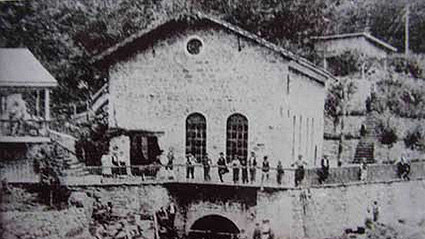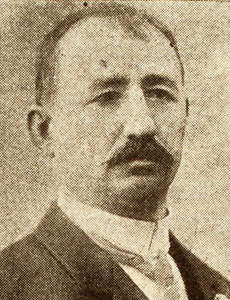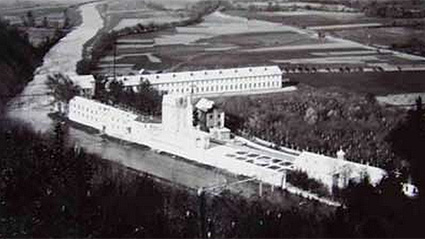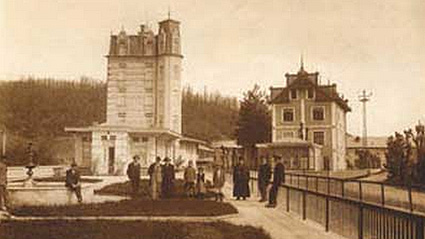
The town of Gabrovo became the leading industrial center of Bulgaria in the end of the 19th and the beginning of the 20th century. It even earned the nickname the Bulgarian Manchester. Ivan Hadjiberov was one of those to blame for that glory – he wasn’t scared by the harsh Bulgarian reality and with no capitals to start with he all the way from a flour trader and producer to a leading manufacturer of fine cloths and a pioneer for Bulgaria’s energy sphere. He was born in 1858 in a rich Gabrovo family. His father produced flour and traded different goods. The man owned a small mill at the Yantra River, where one of the large Gabrovo factories was built up later on – the one of his son.
Curator at Gabrovo Regional Museum of History Dobromir Tarnovksi tells us more on Ivan Hadjiberov: “He started with nothing and the first activity he got involved into was the import of tobacco from South Bulgaria. Thus he earned the money he needed to modernize his father’s business. He built up a roller mill powered by a water  wheel of 30 horse powers. Looking for new challenges, Hadjiberov found himself in Germany in 1901, where he bought 5 looms and an electric dynamo with a few bulbs. This dynamo would bring electricity to Gabrovo, thanks to the water in his father’s mill. Ivan Hadiberov established a weaving factory for fine cloths of wool, as the yarn was imported from Europe and the remaining energy from the mill powered the looms.”
wheel of 30 horse powers. Looking for new challenges, Hadjiberov found himself in Germany in 1901, where he bought 5 looms and an electric dynamo with a few bulbs. This dynamo would bring electricity to Gabrovo, thanks to the water in his father’s mill. Ivan Hadiberov established a weaving factory for fine cloths of wool, as the yarn was imported from Europe and the remaining energy from the mill powered the looms.”
Being particularly interested in what was new in the energy sphere back then, Hadjiberov felt a lack of power at some point and decided to construct a power plant. Gabrovo citizens thought he was crazy and not a single bank would fund his initiative. Moreover, they set property attachment to all he had. Hadjiberov had no choice, but to go to Veliko tarnovo and force with a gun in his hand the manager of Central Bank of Bulgaria to cancel his order and continue with the funding. The power plant was finished in 1906 and it was even depicted by a painter. The globe could be seen on the eastern wall with a girl dancing on top of it /a symbol of the electricity, conquering the world/ and a Bulgarian chain dance underneath of the plant’s constructors, headed by Hadjiberov himself.
“There is a curious story with this chain dance,” Mr. Tarnovski says. “When the builders reached a particularly difficult segment of rocks, the owner called a shepherd pipe player, who had to encourage the workers with his music. Each day finished with a traditional Bulgarian chain dance. Ivan Hadjiberov used to say later on that it wasn’t him, but Nedyalko the shepherd pipe player, who had built the power plant.”
 The first Bulgarian water power plant cost about BGN 300,000. In 1910 it already provided electricity to a part of Gabrovo, the first town in the country with city lights.
The first Bulgarian water power plant cost about BGN 300,000. In 1910 it already provided electricity to a part of Gabrovo, the first town in the country with city lights.
Ivan Hadjiberov’s entire life was devoted to his efforts to bring in contemporary European trends. Thus his unique factory complex was born that included accommodations for workers either. There was an English park, a zoo, an orchard with fruits for everyone. There was even a tennis playground. The first private school was built up for the workers’ children with professional teachers hired. A community center for the leisure time opened doors too…
 “Just like most Gabrovo industrialists, he was a generous donator,” Mr. Tarnovksi goes on to say. “He was a co-establisher and a first donator to the community and library building of the town. He was among the founders of the Industrial Bank – Gabrovo. At the same time Ivan Hadjiberov took part in the 1877 – 1878 Russo Turkish War and then in the Serbian – Bulgarian War afterwards…”
“Just like most Gabrovo industrialists, he was a generous donator,” Mr. Tarnovksi goes on to say. “He was a co-establisher and a first donator to the community and library building of the town. He was among the founders of the Industrial Bank – Gabrovo. At the same time Ivan Hadjiberov took part in the 1877 – 1878 Russo Turkish War and then in the Serbian – Bulgarian War afterwards…”
When Ivan Hadjiberov passed away, he was sent as a dignified and loved person – all Gabrovo factories honored his memory with the wail of their sirens during the funeral ceremony and also with the constant ringing of all churches’ bells…
English version: Zhivko Stanchev
Holy Saturday services begin on Friday evening with Vespers. The Church commemorates the burial of Christ the Saviour and His descent into hell to save the righteous who had died before His work of redemption. Joseph of Arimathea and Nicodemus, with..
On Good Friday, the saddest day for Christians, the liturgy commemorates the suffering, crucifixion and death of Jesus Christ, who sacrificed himself for the guilt and sins of humanity. The service at the Metropolitan Cathedral "St. Nedelya" in..
In 2025, the Catholic and Orthodox churches celebrate Easter on April 20. It is more joyful when we celebrate the Resurrection of Christ together. This is what Father Stefan from the Orthodox Church "St. Nicholas" and parish priest Father Walter..
In 2025, the Catholic and Orthodox churches celebrate Easter on April 20. It is more joyful when we celebrate the Resurrection of Christ together...
On Good Friday, the saddest day for Christians, the liturgy commemorates the suffering, crucifixion and death of Jesus Christ, who sacrificed..
On that day the Saviour hosted the traditional Passover meal for the Jewish people at the home of a Jerusalemite. Before the meal, as a sign of respect, He..

+359 2 9336 661
